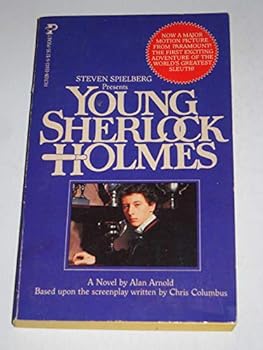Young Sherlk Holme
Select Format
Select Condition 
Book Overview
No Synopsis Available.
Format:Mass Market Paperback
Language:English
ISBN:0671614436
ISBN13:9780671614430
Release Date:December 1985
Publisher:Pocket Books
Length:207 Pages
Weight:0.26 lbs.
Customer Reviews
4 ratings
Eh Tare Homentep, Eh Tare Syristep
Published by Thriftbooks.com User , 16 years ago
I often ready a pulpy novelization, especially those of 80s movies. What sets Young Sherlock Holmes aside from the rest is that the film itself was based upon characters already created by Conan-Doyle. It does break canon, but only slightly. Told, once again, from the point of view of Watson (as old as his voice-over narration was in the movie) the story is of how they first met at Brompton boarding school in 1870. A series of bizarre suicides grabs Holmes' attention and he connects the dots to a murderous Egyptian cult called The Rametep. At the time of its release, YSH was critisized for having too many effects and not enough deduction. Well, the story seems to work just as well on paper and it IS mainly about how Holmes refined his detective skills as a teenager. Of course he's not going to as experienced as his adult counterpart. Alan Arnold fumbles the novel in the last third however by pointlessly going off in a tangent that describes Professor Waxflatter's exploits in Egypt. When he finally comes back to the point he abruptly ends the book while giving the final confrontation and the sad ending as little detail as possible. A case of real bad judgment there, I'm afraid. It cost the book a star, almost two. Young Sherlock Holmes is my favorite movie of all time and I love anything to do with the character. The novelization is a fun read and essential for fans of the film as it is lifted from the original screenplay before a couple of scene were trimmed here and there.
Super Reader
Published by Thriftbooks.com User , 17 years ago
This is a novelisation type deal, based on a screenplay and information done for a movie of the same name. Here, Holmes and Watson meet at a fancy private school. So, of course, Holmes, while still brilliant, is not yet the supercompetent superdetective. One of the masters is murdered, and the boys have to look into it while dealing with school and that sort of lack of freedom.
Young Sherlock Homes
Published by Thriftbooks.com User , 19 years ago
I Need the Journal on the YOUNG SHERLOCK HOLMES
In their younger days...
Published by Thriftbooks.com User , 20 years ago
Sherlock Holmes is one of the best known detectives in the world -- so famous in fact, that 221B Baker Street in London continues to get mail addressed to this fictional character almost a century after he would have died had he been a real person. There are groups of people -- Sherlockians and Holmesians, the distinction between which is rather subtle -- who delight in retelling the tales; it has become somewhat traditional to try to fill in the gaps, things left out of the 'canonical' stories by Sir Arthur Conan Doyle -- 56 short stories and 4 novels. The official tales allude to happenings beyond them -- some authors take up the point there, and others create fanciful tales altogether. This novel, 'Young Sherlock Holmes', derives from the mid-1980s film of the same name, done by Steven Spielberg as an homage to Holmes and Holmes fans. The screenplay, written by Chris Columbus, was adapted here in novel form by Alan Arnold. This story fills in the gaps of Holmes' childhood and education. There are many wonderful pieces here -- it breaks with the canon in that it introduces Holmes (then 16 years old) and Watson as school mates at a private school. Holmes is struggling to learn to play the violin (a canonical piece), and already displays prodigious powers of observation and deduction. He is a loner for the most part, a bit of trouble with authorities and often underestimated. Lestrade is also introduced here, as a junior policeman. The game is afoot in short order when Holmes' favourite, highly-eccentric professor dies mysteriously; this death mirrors in a fashion several other deaths, which leads Holmes and his new sidekick Watson on a merry chase, along with Elizabeth (this early relationship and its outcome is meant to explain the later absence of women in Holmes' life). The headmaster is generally supportive of Holmes, but is his support all that it seems? The chase leads Holmes through the London underworld he will later come to know very well, tracking down a mysterious cult with Egyptian origins. Arnold's researching into the Egyptian lore, as well as details about London and Holmesian detail is impressive. Arnold holds Holmes as an ideal, stating in an author's epilogue that Holmes is as much the chivalric medieval knight as a Victorian and Edwardian gentleman. This is a mystery very much in the spirit of Conan Doyle. The clues are there -- one merely needs to follow them to a logical conclusion. Some purists may balk, but this is an intriguing addition to the body of post-Conan Doyle literature, a worthy pastiche.






